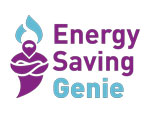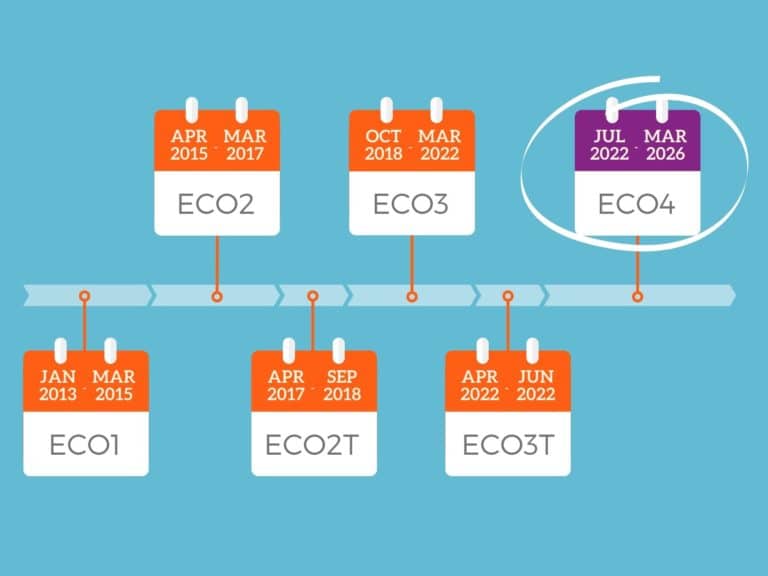This article is about the history of the Energy Company Obligation scheme, otherwise known as ECO. The scheme was first introduced in 2013 as a way to help reduce carbon emissions and improve energy efficiency across the UK. After a number of phases over the years, ECO4 started in July 2022. In this article, we will take a look at the history of this Government grant scheme.
Outline
1. What is the Energy Company Obligation (ECO) and why was it introduced?
2. What has changed during the different phases of ECO?
3. Who pays for ECO grants?
4. What are the benefits of the ECO for energy companies and consumers alike?
5. How has the introduction of ECO4 change things for energy companies and consumers across the UK?
6. How can you find out more about ECO and apply?
7. Frequently asked questions
1. What is the Energy Company Obligation (ECO) and why was it introduced?
The Energy Company Obligation (ECO) is a UK Government scheme that has been designed to improve the energy efficiency of homes and to tackle fuel poverty.
Under the scheme, energy suppliers are required to fund the installation of energy efficiency measures in qualifying households. The types of measures that can be installed under ECO have changed over time, and there have been a range of rules and options for UK households over the years that the scheme has operated.
2. What has changed during the different phases of ECO?
ECO has had four main phases. ECO1 ran from2013 to 2015, ECO2 and ECO2T ran from 2015 to 2018, ECO3 and ECO3T ends in June 2022 and is to be replaced by ECO4 in July 2022. ECO4 is planned to run until 2026 with funding increased from £600m to £1bn per year.
The following details the timeline of the ECO scheme over the years starting with ECO1 and completing with ECO4:
ECO1
(January 13 to March 15)
ECO2
(April 15 to March 17)
ECO2T
(April 17 September 18)
ECO3
(October 18 to March 22)
ECO3T
(April 22 to June 22)
ECO4
(July 22 to March 26)
3. Who pays for ECO grants?
Energy companies are obliged to pay for the ECO scheme, not the government. This is because the UK government has committed to reducing carbon emissions, and one of the ways they plan to do this is by making homes more energy efficient. The ECO scheme is part of this plan.
The energy companies are required to meet certain targets for the number of homes they improve under ECO. If they don’t meet their targets, they have to pay a penalty to the government. The money from the penalties is used to fund other energy efficiency schemes.
4. What are the benefits of the ECO for energy companies and consumers alike?
The ECO scheme provides many benefits for energy companies and consumers. For energy companies, the scheme helps them to meet their carbon reduction targets. It also reduces the amount of money they have to pay in penalties. For consumers, the scheme helps to improve the energy efficiency of their homes. This can lead to lower energy bills and a warmer home.
5. How has the introduction of ECO4 change things for consumers across the UK?
This final phase of the Energy Company Obligation grant scheme is called ECO4. It is started in July and it is expected to run until March 2026. It is designed to help low-income households make their homes more energy-efficient and lower their fuel bills.
Not only will this be of great benefit to those who struggle to pay their energy bills, but it should also help to reduce fuel poverty and carbon emissions in the UK.
The ECO scheme is a government initiative that obliges the big six energy suppliers to improve the energy efficiency of homes. The scheme targets people that receive benefits or that have high fuel costs comparatively to household income. In some areas, certain postcodes are eligible for grants regardless of household income, and some vulnerable households can access grants without needing to claim benefits.
The Government estimates over the four years ECO4 will upgrade around 450,000 homes. They think that most of these homes will have their EPC rating upgraded from a D, E, F or G up to to EPC band C or D.
These households should see reduced household bills from an average of £290 per year up to £1,600 for the most inefficient homes.
6. How can you find out more about ECO and apply?
The first step is to find out whether you’re eligible, and then apply to an installer who has funding in your area. Alternatively, you can apply directly with an organisation like Energy Saving Genie who work with multiple installers covering all grants and areas.
If you apply directly with an installer they will be able to tell you how much funding is available for your property type, what measures could be installed and an estimate of the energy savings you could make.
Installer checklist (if you enquire directly)
- Does the installer have funding available for your EPC band and property type?
- Does the installer have full coverage within your area including surveyors and installers?
- Is the installer able to install all the grants required to improve the energy-efficiency rating of your home? (this is especially important for ECO4 as the property needs to achieve minimum increases in energy-efficiency)
- Which professional bodies is the installer registered with and what guarantees and warranties will you get with installations?
- What timeframe will the installer work to and how long will you need to wait? If the installer has a large waiting list it might be worth shopping around.
- If you don’t claim benefits does the installer cover your local authority area? (installers aren’t all onboarded with the same council’s, so often you might have to shop around if you don’t claim benefits)
- You can then start the process of having your energy efficiency improvements installed. Remember, there are strict eligibility criteria in place and not everyone will be suitable for the scheme.
You can search for installers and contact them directly or you can use our eligibility checker to see if you are eligible. We search the market and work with over 30 installers throughout England, Scotland and Wales. We also provide advice and support to help you make the right decision for your home.
If you are eligible, we’ll put you in touch with an accredited installer in your area who will provide a free proposal. The proposal will be based on the energy efficiency improvements they think will work best for your home.
You can then decide whether or not to proceed. You can check eligibility now at www.energysavinggenie.co.uk
Grants are available now!
7. Frequently asked questions
What is the Energy Company Obligation scheme?
The Energy Company Obligation is a government energy efficiency scheme. It was introduced in 2013 to reduce carbon emissions and to help people save on their energy bills.
What is ECO?
ECO is the Energy Company Obligation scheme, a UK government scheme that aims to tackle fuel poverty and reduce carbon emissions.
How does ECO work?
The ECO scheme provides funding to energy suppliers, who then use this to offer discounts and grants to eligible customers. They usually allocate funding to registered installers who provide the grants, and then these installers claim the funding from the energy company.
What are the eligibility criteria for ECO?
Eligibility for the ECO scheme is based on a number of factors, in some cases eligibility will depend on household income, property type, and whether or not you receive certain benefits. The easiest way to check your eligibility is to use our grant checker at www.energysavinggenie.co.uk
Do I have to pay for the improvements?
The energy company obligation is a government scheme that is funded by the UK’s largest energy suppliers. In some cases improvements will be covered by the energy supplier but in some instances there can be charges. The installer will carry out an energy assessment and calculate the funding available and let you know if there will be any contributions required towards the home improvements.
How do I apply for ECO?
To apply for an Energy Company Obligation grant you can either apply directly with an accredited installer, or apply with company that works with multiple installers like us at Energy Saving Genie. The company or the installer will be able to assess your application and provide you with an indication of eligibility. The availability of grants isn’t confirmed until a free no obligation survey takes place, organised by the installer and subject to availability (the grant rules can change at any time and without notice!). Following the survey, if you are happy with the proposal, once the installer has completed the install they will apply for funding on your behalf from the energy supplier that they have funding through.
Will there be an ECO4?
Yes! It has already started and ECO4 is expected to run until March 2026 (or whenever energy companies reach their obligation). Over the 4 years it is expected to cost £4 billion, £1 billion per year.
What is the ECO4 scheme?
ECO4 started in July 2022 and it will run until March 2026 (or earlier if energy suppliers reach their obligation). It is an energy-efficiency grant scheme that targets homes in the UK with an Energy Performance Certificate (EPC) rating of D or lower (so only homes with a D, E, F or G are eligible). The household will need to claim benefits or meet income or vulnerability criteria. The easiest way to check eligibility is to use a grant checker like ours at www.energysavinggenie.co.uk.
The Energy Company Obligation (ECO) scheme is a vital initiative that has helped to improve energy efficiency and reduce carbon emissions across the UK.
The final phase of the scheme, ECO4, started in July 2022 and will provides very generous funding for households who want to make energy-saving improvements. If you’re not sure if you’re eligible for help under ECO4, or you need advice on how to make your home more energy efficient, please user our free eligibility checker.
We can offer advice on everything from loft insulation to renewable energy technologies, so don’t hesitate to get in touch.



